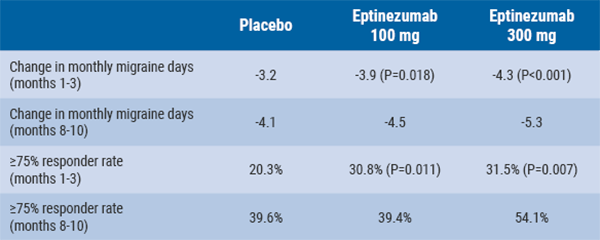Eptinezumab is a calcitonin gene-related peptide receptor antagonist. In PROMISE-1, eligible adults with episodic migraine were randomised to 4 infusions every 12 weeks of eptinezumab 30 mg, 100 mg, 300 mg, or placebo. The primary endpoint was change in mean monthly migraine days in the first 3 months (see Table). In the efficacy population (n=888) baseline mean monthly migraine days were ~8.5.
Table: Efficacy results of eptinezumab in PROMISE-1 [1]

Also presented were results of the PROMISE-2 trial, investigating the impact of eptinezumab on patient global impression of change (PGIC) and self-reported most bothersome associated symptom (MBAS) in patients with chronic migraine [2]. The efficacy population included 1,072 patients (100 mg, n=356; 300 mg, n=350; placebo, n=366). After 4 weeks, MBAS was much or very much improved in 45.0%, 56.9%, and 28.9% of patients, respectively. PGIC was much or very much improved in 45.0%, 59.0%, and 32.3%, respectively. Improvement was maintained or further improved after 12 and 24 weeks. The similar trends in MBAS and PGIC improvement across time points suggest these are highly correlated.
1. Saper J, et al. AAN 2019, S38.003.
2. Cady R, et al. AAN 2019, S38.009.
Posted on
Previous Article
« Mesenchymal stem cells in a proof-of-concept study Next Article
Subspecialty teleneurology: feasible and highly valued »
« Mesenchymal stem cells in a proof-of-concept study Next Article
Subspecialty teleneurology: feasible and highly valued »
Table of Contents: AAN 2019
Featured articles
Letter from the Editor
Interview with Prof. Natalia Rost
Alzheimer's Disease and other Dementias
Amyloid PET in cognitively impaired patients
Tight blood pressure control lowers risk of mild cognitive impairment
Epilepsy
Headache and Migraine
Multiple Sclerosis and NMOSD
Immune tolerance by peptide-loaded tolerogenic dendritic cells
Biotin, ocrelizumab, and ibudilast in progressive MS
No increased MS relapse risk postpartum
Neuromuscular Disorders
First-ever effective and safe treatment of CMT1A
Parkinson’s Disease and other Movement Disorders
Leukaemia and hypertension therapies tested in Parkinson’s disease
Stroke
Miscellaneous
Possibly lifesaving therapy in refractory PML
New AAN guideline for treating Tourette syndrome
Subspecialty teleneurology: feasible and highly valued
Related Articles
July 30, 2019
Updates on three treatments of spinal muscular atrophy
July 30, 2019
Fremanezumab efficacy and safety maintained over 1 year
© 2024 Medicom Medical Publishers. All rights reserved. Terms and Conditions | Privacy Policy

